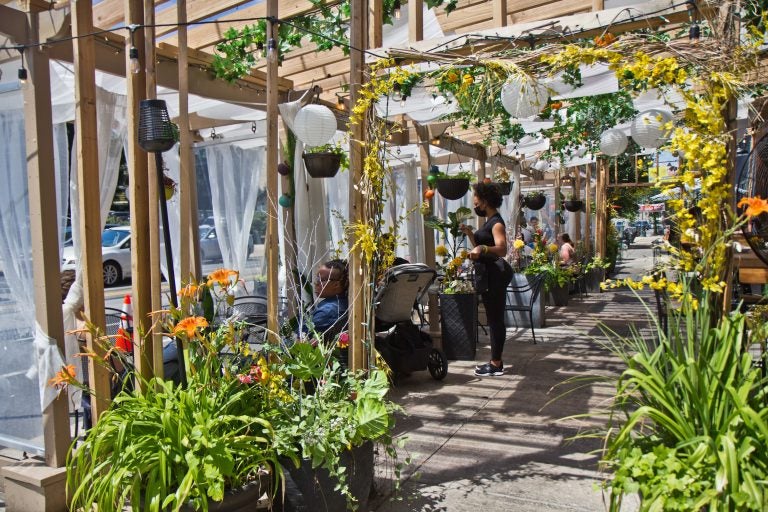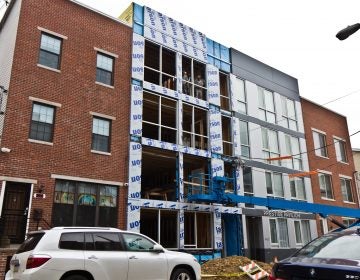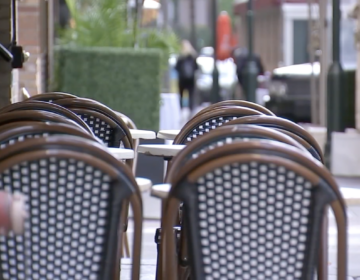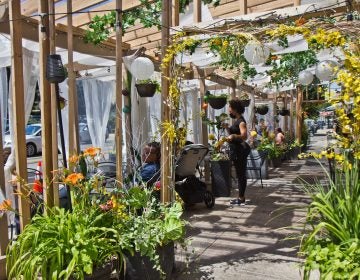Dining tables over parking spaces: Streeteries move toward permanence in some Philly neighborhoods
Philadelphia’s pandemic-inspired experiment with expanded outdoor dining is poised to end with streeteries made permanently legal in certain parts of the city.

Outdoor dining at Booker’s restaurant in West Philadelphia. (Kimberly Paynter/WHYY)
Philadelphia’s pandemic-inspired experiment with expanded outdoor dining is poised to end with streeteries made permanently legal in certain parts of the city.
City Council’s Committee on Streets and Services on Tuesday unanimously approved an amended bill that would allow restaurants to serve diners in outdoor structures built over parking spaces in Center City, Old City, University City, East Passyunk, and other specified areas.
Eateries located outside of those boundaries would need a district Councilmember to introduce an ordinance and the full Council to approve the measure, keeping intact a longstanding practice known as councilmanic prerogative, which gives lawmakers considerable control over activities in their districts.
The amended bill, introduced by Councilmember Allan Domb, represents a compromise — an earlier version would have expanded outdoor dining permanently across the city exclusively through a system of approvals run by the Kenney administration.
“The Committee’s approval is a major step forward toward making this remarkable outdoor dining amenity a permanent fixture for our city,” Domb said in a public statement. “Streeteries have saved so many restaurants throughout the pandemic, and we expect the permanency will allow businesses to invest in high-quality, safe, and accessible structures that will support the future of our city.”
Following a flurry of behind-the-scenes activity, the committee also approved a bill introduced by Council President Darrell Clarke that would enable restaurants issued temporary sidewalk cafe licenses as part of the city’s emergency program to continue operating them through the end of 2022.
Clarke had argued that Domb’s initial legislation didn’t give communities the opportunities to weigh in on the impacts of expanded dining in their neighborhoods.
“I do think that it is important for those individuals who know these communities best — be it an RCO [Registered Community Organization], be it a block captain, be it a person who actually got elected to represent a specific group of people — to have an integral part and involvement in the locations and the placement of these,” Clarke said Tuesday.
The Kenney administration has said it supports creating a permanent outdoor dining program — “with limitations regarding structures related to public safety and accessibility.”
Both bills will be voted on by the full Council during Thursday’s regularly scheduled session, potentially setting up a final vote next week.
Two other related bills were held by Domb and Clarke, who offered competing visions for outdoor dining in Philadelphia.
Leveling the playing field for neighborhood eateries
Testimony during the three-hour hearing was overwhelmingly in support of Domb’s legislation, with speaker after speaker urging Council to make permanent the “lifeline” they offered to restaurants around the city through the emergency program.
“We need these bills in place so that we simplify the process to make sure that operators can be of good faith and do this correctly,” said Qamara Edwards, director of business and events for Sojourn Philly, which operates several restaurants in the city, including Jet Wine Bar and Rex at the Royal in Center City.
“The vast majority of operators are trying to add beauty to this city and add vibrancy to the city and bring economy back to the city of Philadelphia.”
Others praised Domb’s legislation because they say it would create a streamlined citywide process for obtaining a permanent streetery license — one that would in many cases not require a bill from a district Councilmember.
Jabari Jones, president of the West Philadelphia Corridor Collaborative, said the permanent program outlined in the bill that moved forward would enable City Council to tackle more “important” issues, as well as level the playing field for smaller neighborhood eateries, who may be less familiar with city processes than some of their counterparts.
The legislation that passed last year on an emergency basis enabled restaurants to apply for temporary licenses for sidewalk cafes and streeteries. The program saw the number of outdoor dining licences grow from 230 to 830, according to city data crunched by Domb’s office.
Not surprisingly, most of the outdoor dining licenses issued by the city are clustered in and around Center City. However, licenses were issued for eateries throughout the city, according to the analysis.
The ZIP code 19147, which encompases Queen Village and part of Bella Vista in South Philadelphia, had the most sidewalk cafes and streeteries.
The city issued zero licenses to eateries in a dozen ZIP codes, including ones covering parts of North Philadelphia, Northeast Philadelphia, West Philadelphia and Northwest Philadelphia.
“We should be working to break down the policy barriers that limit the revenue that businesses can generate and limit the number of jobs that they can employ,” Jones said. “More importantly, we should have faith in our business community that they have the same vested interest as Council to make sure that outdoor dining structures are safe, secure, and comfortable.”
Designing to be ‘crash-proof’
Under Domb’s legislation, restaurants would be able to apply for annual streetery license from the Department of Licenses and Inspections, which would be responsible for enforcing the measure’s regulations and have the authority to remove a particular structure if it’s not up to code or not being used.
Applications would cost $200. The money would go towards the first annual license fee. (The city did not charge restaurants to have a temporary streetery license). Licenses and Department and Streets Department would also assess applicants a still-to-be-determined administrative and enforcement fee, according to the bill.
To be approved, structures would have to meet certain design and placement requirements. For example, they would have to be no wider than six feet; include a “crash-proof” physical barrier to keep diners safe from traffic; be ramp accessible; and be located in a parking lane directly abutting the restaurant.
Streeteries could only be operated for business between 7 a.m. and 10 p.m. Sunday through Thursday and 7 a.m. to 11 p.m. on Friday and Saturday.

Subscribe to PlanPhilly
WHYY is your source for fact-based, in-depth journalism and information. As a nonprofit organization, we rely on financial support from readers like you. Please give today.








